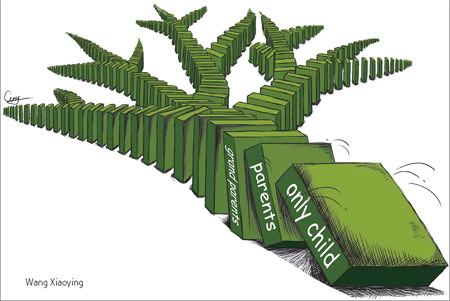
|
CHINA> National
 |
|
Loss of a child sends families into crisis
By Lin Shujuan in Beijing and Qian Yanfeng in Shanghai (China Daily)
Updated: 2009-08-11 09:54 It has been eight years since her only daughter died, but Ke Bin still cannot talk about her "beautiful girl" in the past tense. "It was her 28th birthday this year," said the heartbroken mother as she stared into the midday sky above Shanghai. Ke is 57 and one of a growing number of Chinese parents who have become unfortunate victims of the side effects of the country's one-child rule. She said she not only lost a daughter, but also her future.
 Outliving a child is an unbearable prospect for parents over the age of 45 like Ke, the first generation subject to a family planning policy written three decades ago, as they must contemplate a life without the one person they would have traditionally relied on for emotional and financial support. "I never know what to say when someone asks if I have a child. All I can say is I used to," said Ke, a Shanghai native who was one of the "educated youth" sent to the countryside of East China's Jiangxi province during the "cultural revolution" (1966-76).
"I had never thought I would fail to bring up my own child," said her father Zhu Jianhua as he choked back tears. "I can't help but feel so ashamed I couldn't save her." For the following two years, Ke was too heartbroken to work, while the years of paying for Zhu Qing's medication and surgery had taken her and Zhu Jianhua to the edge of bankruptcy. "This is just too hard," sobbed Ke. "We can't shoulder this all on our own. We shouldn't have to." Imposed in 1979, the family planning policy was designed to control China's exploding population and ensure better education and health care. The law includes exceptions for ethnic minority groups, rural families and couples who are from single-child families. Under the policy, almost 36 percent of the population, most in cities, is limited to one child, said Zhai Zhenwu, director of the school of population and sociological studies at the Renmin University of China in Beijing. He said there were now more than 100 million single-child families in China. |